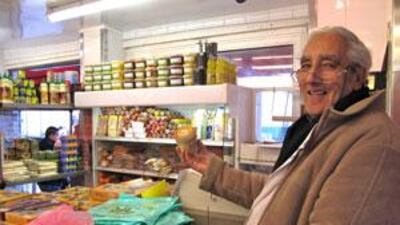Paris // For the unsuspecting visitor to the working class Parisian quarter of Barbès-Rochechouart, delicacies such as foie gras and confit de canard would probably seem out of place on grounds of affordability and custom alone. Men without work gather several deep on the pavements to smoke and chat, while women crowd into the rough-and-ready market beneath a raised section of the Paris Métro in search of bargains for the essentials of life.
But amid all the signs that, for many, times are hard, it is possible to wander into an Algerian-owned butcher's shop and buy halal foie gras. As a mark of growing sophistication and taste for experiment among France's Muslim community, Europe's largest at between five and seven million according to estimates, sales have risen dramatically in recent years. Across the street from the noise and congestion of the Barbès-Rochechouart market, the Boucherie de la Place looks at first glance like any traditional French butcher's shop. But the shop sign has Arabic characters, too, and inside the maghrébin influence becomes clear, with an abundance of halal meat and a photograph of the Algerian football team dominating the wall.
As he deals with a steady stream of mainly Muslim customers, the owner, Aziz Hamdame, thinks at first that he has sold out of halal foie gras. Then a relative produces a jar. "It sells very well," he says. "Tastes are evolving and there are also a lot of mixed relationships now in France. "It is a little quieter at present but it sells like hot cakes whenever there are festivals coming up, whether Muslim or Christian, or for marriage receptions."
One mixed relationship, between Ahmed Fettani, a French-Algerian, and his French wife Annick, has led to a remarkable success story in food marketing. From Saint Privat in the Corrèze, an area of the south-west that is as deeply rural as la France profonde gets, the Fettanis run Bienfaits de France, supplying wholesale food distributors with a variety of halal products, notably foie gras and confit de canard. The couple seem as proud as anyone involved in the food trade in France when stressing that they buy only French ducks for their produce.
Sales of halal confit have risen 34 per cent since the business began in 2006. In the case of foie gras, the growth is 28 per cent since 2006 and 13 per cent year on year from 2008 to 2009. "French society has become such a mixture that it is not surprising that people are trying new things," says Mrs Fettani. "The taste is no different from classic foie gras as the means of preparation are identical. The only difference is that we used halal ducks."
The Bienfaits de France website states: "Our ducks, chickens and rabbits are sacrificed, cut and processed in strict observance of Muslim rites." While non-Muslim French usually choose sweet white wine to accompany foie gras, Mrs Fettani says a natural alternative for Muslims would be non-alcoholic grape juice, sold in red, white and sparkling varieties. The couple currently sells their products only in France but are hoping to expand to the export market.
Sales growth has been even more marked in branches of supermarket chains serving areas with large concentrations of Muslim residents. At Gennevilliers, on the outskirts of Paris, Carrefour reports sales 10-times higher than two years ago, with up to 30 jars or tins sold daily at busy times. For all the advances made by distributors such as the Fettanis, and the increased availability at supermarkets, some French Muslims have clearly not yet got the message. "I have never tried it because I didn't know it existed," says a well-educated French-born Muslim, Mounia Benaili, who lives in Paris. "But I am going to try it if I come across it. Certainly it's a question of religion but above all, in an age of junk food when we don't even know what we're eating with mass-produced products, it is the fact that halal meat has been cleansed both spiritually and physically."
Ms Benaili says cost is also a factor because halal products are generally dearer. Although wide variations in quality and recipe make comparisons difficult, a jar bought by The National from Mr Hamdane was - at ?14.90 (Dh74) for 180g - only marginally more expensive than equivalent non-halal varieties found online. And not every French Muslim is ready for the experience of eating it. The search for a volunteer in Barbès-Rochechouart to sample Mr Hamdane's foie gras led coincidentally to the Restaurant Familial, run by his grandson, Yassin, 28. "I'm not going to like this," he said, even before trying a slice with French baguette. One taste was enough to confirm his preconception, which had nothing to do with whether or not it was halal. With French emphasis, he declared: "Foie gras! That's for the bourgeoisie. I can tell you it's not going to replace couscous at my restaurant."
crandall@thenational.ae


